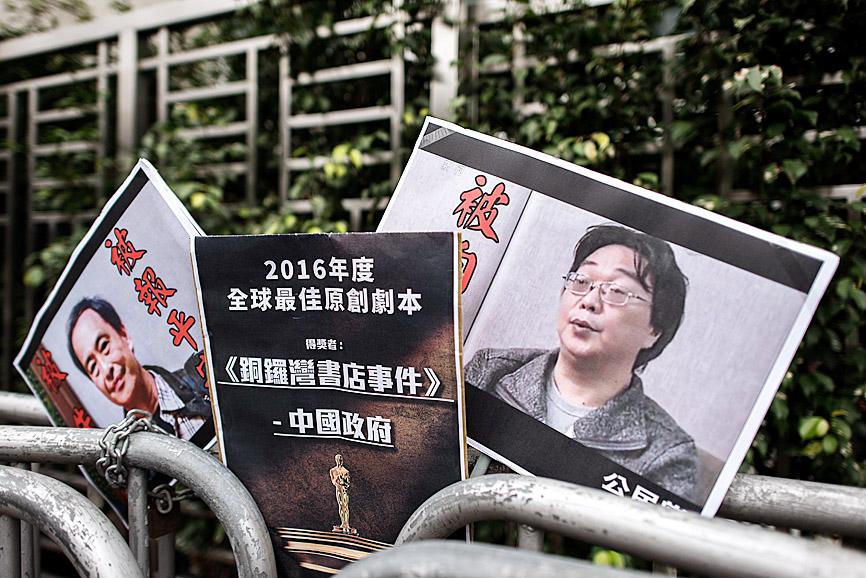Beijing could request countries with which it has extradition agreements to deport Taiwanese to China to face criminal charges following the implementation of national security legislation for Hong Kong, a former Mainland Affairs Council (MAC) official warned yesterday.
Some developing countries, and those close to China because of the Belt and Road Initiative, are likely to accommodate Beijing’s requests to extradite Taiwanese to China, said former deputy MAC minister Chen Ming-chi (陳明祺), who served from July 2, 2018, until May 20, and then returned to his former post as an assistant professor of sociology at National Tsing Hua University.
While Taiwanese should be aware of this situation, they should not restrain their pursuit of freedom of speech, Chen said.

Photo: AFP
“If we remain silent about the situation in Hong Kong, we would be playing into Beijing’s hands. The more China oppresses freedom of speech, the more we should voice our support for Hong Kong,” he said.
The government should work with nations that share similar democratic values to speak up for Hong Kong’s freedom, he added.
That would help limit the horrible effects that the Hong Kong national security legislation would have, he said.
Tung Li-wen (董立文), a consultant for the Taiwan Thinktank, said that Taiwanese are in danger of being deported to China when they visit countries that have extradition agreements with Beijing.
The risk of deportation would be even higher if they travel to pro-Beijing countries that have underdeveloped legal systems, he added.
Extradition agreements generally do not apply to political cases and countries with well-established democratic systems would review extradition requests on a case-by-case basis, he said.
“Taiwanese need to be extra careful when they visit countries that have extradition agreements with Hong Kong,” Tung said.
An example of a person detained by Beijing abroad is Chinese-born Swedish citizen Gui Minhai (桂民海), one of the shareholders of Causeway Bay Bookstore in Hong Kong, who was kidnapped from his holiday home in Thailand in 2015 and reappeared in a video confession in China in 2016.
Gui in Febraury was sentenced to 10 years in prison for illegally providing intelligence overseas.
In cross-strait telephone scams run from a third country, Beijing has also requested host countries to extradite Taiwanese suspects to stand trial in China.
Article 38 of the Hong Kong National Security Law states that the law also applies to non-Hong Kong residents who contravene Chinese laws outside Hong Kong.
Australia, Canada and other countries have suspended the execution of their extradition agreements with Hong Kong due to the article.

The US government has signed defense cooperation agreements with Japan and the Philippines to boost the deterrence capabilities of countries in the first island chain, a report by the National Security Bureau (NSB) showed. The main countries on the first island chain include the two nations and Taiwan. The bureau is to present the report at a meeting of the legislature’s Foreign Affairs and National Defense Committee tomorrow. The US military has deployed Typhon missile systems to Japan’s Yamaguchi Prefecture and Zambales province in the Philippines during their joint military exercises. It has also installed NMESIS anti-ship systems in Japan’s Okinawa

‘WIN-WIN’: The Philippines, and central and eastern European countries are important potential drone cooperation partners, Minister of Foreign Affairs Lin Chia-lung said Minister of Foreign Affairs Lin Chia-lung (林佳龍) in an interview published yesterday confirmed that there are joint ventures between Taiwan and Poland in the drone industry. Lin made the remark in an exclusive interview with the Chinese-language Liberty Times (the Taipei Times’ sister paper). The government-backed Taiwan Excellence Drone International Business Opportunities Alliance and the Polish Chamber of Unmanned Systems on Wednesday last week signed a memorandum of understanding in Poland to develop a “non-China” supply chain for drones and work together on key technologies. Asked if Taiwan prioritized Poland among central and eastern European countries in drone collaboration, Lin

ON ALERT: Taiwan’s partners would issue warnings if China attempted to use Interpol to target Taiwanese, and the global body has mechanisms to prevent it, an official said China has stationed two to four people specializing in Taiwan affairs at its embassies in several democratic countries to monitor and harass Taiwanese, actions that the host nations would not tolerate, National Security Bureau (NSB) Director-General Tsai Ming-yen (蔡明彥) said yesterday. Tsai made the comments at a meeting of the legislature’s Foreign Affairs and National Defense Committee, which asked him and Minister of National Defense Wellington Koo (顧立雄) to report on potential conflicts in the Taiwan Strait and military preparedness. Democratic Progressive Party (DPP) Legislator Michelle Lin (林楚茵) expressed concern that Beijing has posted personnel from China’s Taiwan Affairs Office to its

BACK TO WORK? Prosecutors said they are considering filing an appeal, while the Hsinchu City Government said it has applied for Ann Kao’s reinstatement as mayor The High Court yesterday found suspended Hsinchu mayor Ann Kao (高虹安) not guilty of embezzling assistant fees, reducing her sentence to six months in prison commutable to a fine from seven years and four months. The verdict acquitted Kao of the corruption charge, but found her guilty of causing a public official to commit document forgery. The High Prosecutors’ Office said it is reviewing the ruling and considering whether to file an appeal. The Taipei District Court in July last year sentenced Kao to seven years and four months in prison, along with a four-year deprivation of civil rights, for contravening the Anti-Corruption